Tau ELISA Kits
Tau is a microtubule-associated protein expressed primarily in the central nervous system. It is a major component of neurofibrillary tangles (NFTs) observed in the neurons of Alzheimer's disease (AD) patients. They are also observed in Pick's disease, progressive supranuclear palsy, corticobasal degeneration, and other conditions, which are collectively referred to as tauopathies. Total tau levels in cerebrospinal fluid (CSF) are known to increase in AD patients, and elevated levels are believed to reflect the extent of neuronal damage and neurodegeneration. Tau in NFTs is also known to undergo excessive phosphorylation. Phosphorylated tau in CSF is considered a biomarker for AD.
Fujifilm Wako provides ELISA kits that can measure total tau or pTau T181 in human cerebrospinal fluid.
What is Tau?
Tau is a microtubule-associated protein expressed primarily in the central nervous system, where it regulates the stability of microtubules. It is a major component of neurofibrillary tangles (NFTs) observed in the neurons of Alzheimer’s disease (AD) patients. Furthermore, there is a correlation between tau accumulation in the brain and the severity of cognitive impairment1), suggesting that tau is closely involved in the onset of AD. It should be noted that NFTs characterized by tau accumulation are not exclusive to AD; they are also observed in Pick's disease, progressive supranuclear palsy, corticobasal degeneration, and other conditions, which are collectively referred to as tauopathies.
Total tau levels in cerebrospinal fluid (CSF) are known to increase in AD patients, and elevated levels are believed to reflect the extent of neuronal damage and neurodegeneration2-3). The reason for the increase in tau in CSF remains unclear; however, it is hypothesized that tau may be released extracellularly as a result of cell death or actively secreted by neurons.
Tau in NFTs is known to undergo excessive phosphorylation. Phosphorylated tau in CSF is considered a biomarker for AD, with pTau T181—tau phosphorylated at the 181st threonine residue—recognized, in particular, as a specific biomarker for the disease4). Recent studies have shown that pTau T181 in CSF reflects the accumulation of Aβ in the brain rather than tau accumulation5).
Tau ELISA Kit Wako
The Tau ELISA Kit Wako is designed to measure total tau in human CSF. It uses two types of antibodies: one that recognizes the middle region of the tau protein and another that recognizes the C-terminus, allowing for the detection of all tau, regardless of its phosphorylation state.
Kit Performance
| Assay target | Total Tau |
|---|---|
| Calibration curve range | 4.10-1,000 pg/mL |
| Analysis sample | Human CSF |
| Sample volume | 10 μL (50 μL recommended) |
| Measurement duration | Approx. 3 hours |
| Detection method | Luminescence (A plate reader for luminescence measurement is required) |
Assay Principle
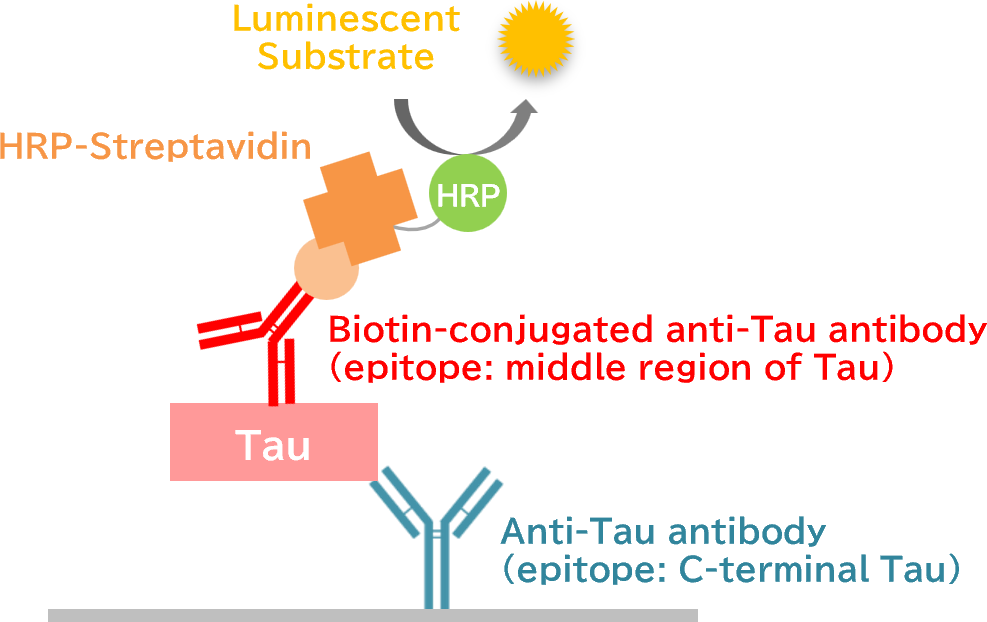
Data
Measurement in Human CSF
CSF from non-dementia patients (Control), patients with MCI and AD patients (AD) was analyzed using this product and another commercially available product.
[Result]
An increase in total tau levels was confirmed in AD and MCI patients compared to the control group.
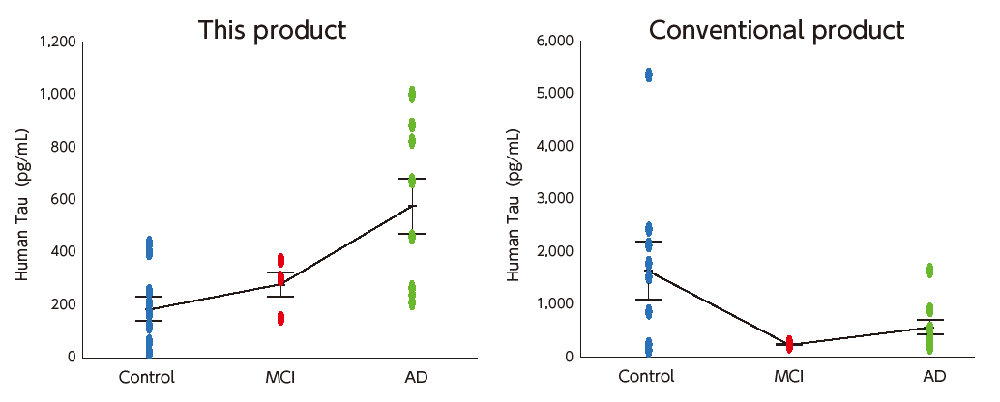
Correlation Data with Cognitive Function Test (MMSE Score)
The correlation between the concentration of total tau in CSF, as measured by this product, and the MMSE scores of the patients was measured.
MMSE Score
≦ 23 : Dementia suspected
24-27 : MCI suspected
28-30 : Normal
[Result]
A negative correlation was observed between tau concentration and MMSE scores, with this product showing a stronger correlation compared to another commercially available product.
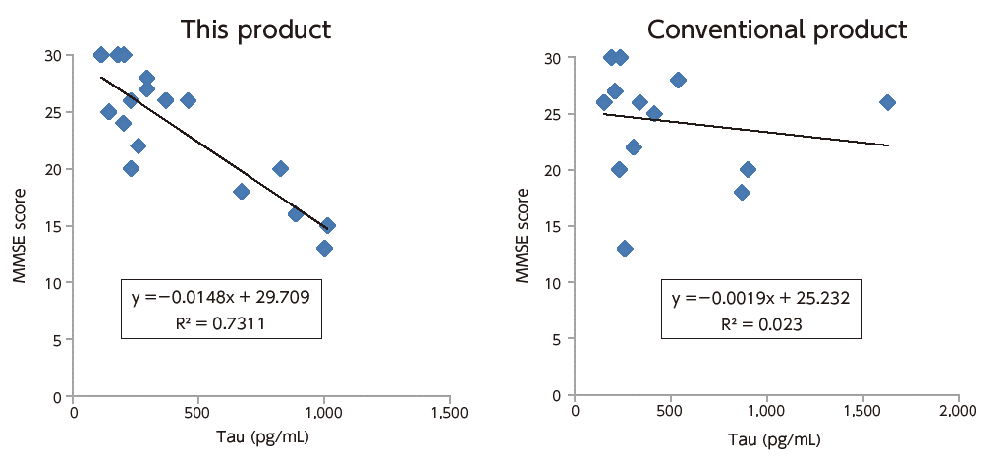
Phosphorylated Tau T181 ELISA Kit Wako
The Phosphorylated Tau T181 ELISA Kit Wako is designed to measure pTau T181 in human CSF. By using an anti-pTau T181 antibody as the capture antibody, this kit specifically measures pTau T181.
Kit Performance
| Assay target | Phosphorylated Tau T181 |
|---|---|
| Calibration curve range | 4.40-500 pg/mL |
| Analysis sample | Human CSF (no used for serum and plasma) |
| Sample volume | 20 μL |
| Measurement duration | Approx. 20 hours |
| Detection method | Luminescence (A plate reader for luminescence measurement is required) |
Assay Principle

Data
Measurement in Human CSF
CSF from non-dementia patients (Control), patients with MCI and AD patients (AD) was analyzed using this product and another commercially available product.
[Result]
An increase in total tau levels was confirmed in AD and MCI patients compared to the Control group.
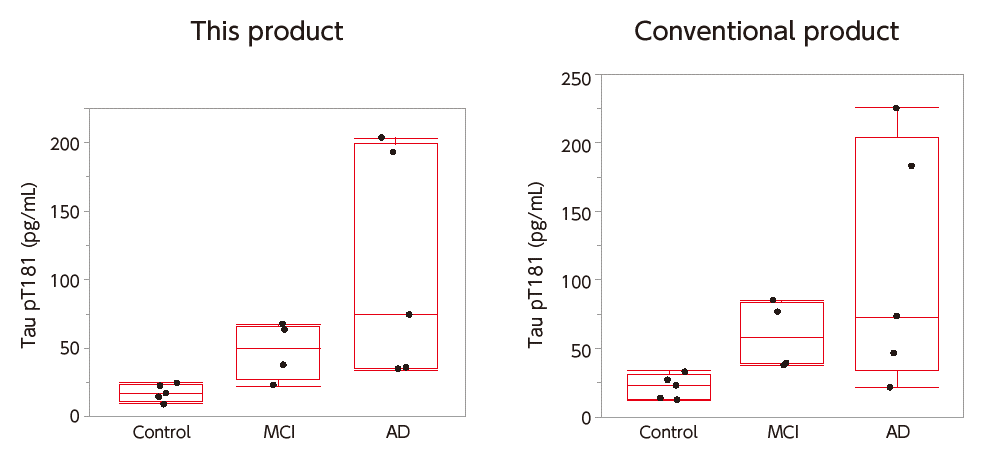
Correlation Data with Cognitive Function Test (MMSE Score)
The correlation between the concentration of pTau T181 in CSF, as measured by this product,and the MMSE scores of the patients were measured.
MMSE Score
≦ 23 : Dementia suspected
24-27 : MCI suspected
28-30 : Normal
[Result]
A negative correlation was observed between the concentration of pTau T181 and MMSE scores.
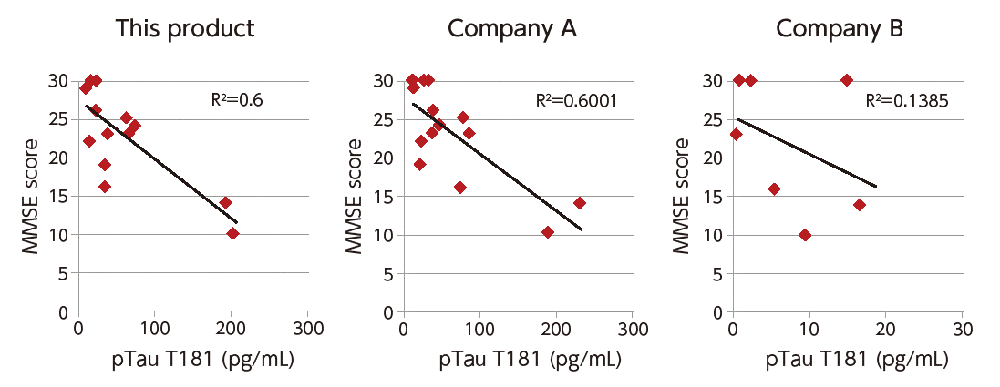
References
- Nelson, P. T. et al.: J. Neuropathol. Exp. Neurol., 71(5), 362(2012).
Correlation of Alzheimer disease neuropathologic changes with cognitive status: a review of the literature - Arai, H. et al.: Ann. Neurol., 38(4), 649(1995).
Tau in cerebrospinal fluid: a potential diagnostic marker in Alzheimer's disease - Blennow, K. and Hampel, H.: Lancet Neurol., 2(10), 605(2003).
CSF markers for incipient Alzheimer's disease - Schoonenboom, N. S. et al.: Neurology, 78(1), 47(2012).
Cerebrospinal fluid markers for differential dementia diagnosis in a large memory clinic cohort - Therriault, J. et al.: JAMA Neurol., 80(2), 188(2023).
Association of Phosphorylated Tau Biomarkers With Amyloid Positron Emission Tomography vs Tau Positron Emission Tomography
Product List
- Open All
- Close All
Tau ELISA Kit
Phosphorylated Tau ELISA Kit
For research use or further manufacturing use only. Not for use in diagnostic procedures.
Product content may differ from the actual image due to minor specification changes etc.
If the revision of product standards and packaging standards has been made, there is a case where the actual product specifications and images are different.





